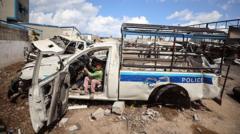Amid Palestinian protests and ongoing negotiations, Trump voiced confidence in reaching a ceasefire with Hamas, while Netanyahu spoke of plans for Palestinian relocation.
Trump Optimistic About Ceasefire Progress in Gaza Amid Netanyahu Visit

Trump Optimistic About Ceasefire Progress in Gaza Amid Netanyahu Visit
President Trump and Prime Minister Netanyahu discuss potential end to the Gaza conflict during a meeting in Washington D.C.
In a recent meeting in Washington D.C., President Donald Trump expressed optimism regarding the ongoing negotiations to establish a ceasefire in the Gaza conflict, which has persisted for 21 months. During a dinner with Israeli Prime Minister Benjamin Netanyahu, Trump stated, "Talks are going along very well," and hinted at Hamas's willingness to consider a ceasefire agreement, marking a shift in perspectives as discussions continue.
Both leaders addressed media inquiries regarding the future of Palestinians, with Trump highlighting collaboration with neighboring countries in exploring potential relocation plans. Although the latest ceasefire discussions in Qatar concluded with no concrete resolutions, they are set to persist throughout the week. When pressed on impediments to a peaceful resolution, Trump responded, "I don't think there is a hold-up," indicating his belief in advancing diplomatic efforts.
Netanyahu aligned with Trump on the issue of Palestinian relocation, asserting his commitment to working closely with the U.S. on initiatives for a "better future" for Palestinians. Notably, he downplayed the likelihood of full Palestinian statehood, maintaining that Israel would "always" exercise security control over Gaza, emphasizing that the nature of governance there does not necessarily equate to statehood.
During their meeting, Netanyahu nominated Trump for the Nobel Peace Prize, a gesture reflecting alleged peace facilitation in the region. Despite initial reluctance to make the meeting public, it was reported extensively afterward, highlighting the significance of the discussions.
The proposals on the table include a US-supported ceasefire that would mandate Hamas to release hostages while Israel commits to the release of Palestinian prisoners and a partial withdrawal from Gaza. However, significant challenges remain, particularly concerning the humanitarian aid conditions proposed by Hamas, which clash with Israeli strategic interests.
As Netanyahu concluded his discussions with Trump, protests erupted outside the White House from Palestinian advocates opposing the Israeli leader's policies. Accusations of war crimes have tainted Netanyahu's administration, with an International Criminal Court warrant previously issued against several Israeli officials, including himself. Netanyahu has dismissed these allegations as baseless and rooted in antisemitism, while the Trump administration has reacted by imposing sanctions on ICC personnel.
As the negotiations reset in Doha, an anticipated meeting is expected with U.S. officials aiming to impose a ceasefire as talks progress. U.S. Ambassador to Israel, Mike Huckabee, refrained from commenting on the likelihood of Trump offering any guarantees regarding future extensions of the ceasefire, a sticking point in the discussions.
With Trump having hosted Netanyahu multiple times since taking office, this meeting stands as crucial in the context of high tensions following military actions against Iranian nuclear sites, indicating a critical juncture in the realignment of U.S. foreign policy in the Middle East. White House spokeswoman Karoline Leavitt reiterated that achieving a ceasefire in Gaza remains a "utmost priority" for the Trump administration, with hopes for immediate agreement from Hamas.
Both leaders addressed media inquiries regarding the future of Palestinians, with Trump highlighting collaboration with neighboring countries in exploring potential relocation plans. Although the latest ceasefire discussions in Qatar concluded with no concrete resolutions, they are set to persist throughout the week. When pressed on impediments to a peaceful resolution, Trump responded, "I don't think there is a hold-up," indicating his belief in advancing diplomatic efforts.
Netanyahu aligned with Trump on the issue of Palestinian relocation, asserting his commitment to working closely with the U.S. on initiatives for a "better future" for Palestinians. Notably, he downplayed the likelihood of full Palestinian statehood, maintaining that Israel would "always" exercise security control over Gaza, emphasizing that the nature of governance there does not necessarily equate to statehood.
During their meeting, Netanyahu nominated Trump for the Nobel Peace Prize, a gesture reflecting alleged peace facilitation in the region. Despite initial reluctance to make the meeting public, it was reported extensively afterward, highlighting the significance of the discussions.
The proposals on the table include a US-supported ceasefire that would mandate Hamas to release hostages while Israel commits to the release of Palestinian prisoners and a partial withdrawal from Gaza. However, significant challenges remain, particularly concerning the humanitarian aid conditions proposed by Hamas, which clash with Israeli strategic interests.
As Netanyahu concluded his discussions with Trump, protests erupted outside the White House from Palestinian advocates opposing the Israeli leader's policies. Accusations of war crimes have tainted Netanyahu's administration, with an International Criminal Court warrant previously issued against several Israeli officials, including himself. Netanyahu has dismissed these allegations as baseless and rooted in antisemitism, while the Trump administration has reacted by imposing sanctions on ICC personnel.
As the negotiations reset in Doha, an anticipated meeting is expected with U.S. officials aiming to impose a ceasefire as talks progress. U.S. Ambassador to Israel, Mike Huckabee, refrained from commenting on the likelihood of Trump offering any guarantees regarding future extensions of the ceasefire, a sticking point in the discussions.
With Trump having hosted Netanyahu multiple times since taking office, this meeting stands as crucial in the context of high tensions following military actions against Iranian nuclear sites, indicating a critical juncture in the realignment of U.S. foreign policy in the Middle East. White House spokeswoman Karoline Leavitt reiterated that achieving a ceasefire in Gaza remains a "utmost priority" for the Trump administration, with hopes for immediate agreement from Hamas.


















